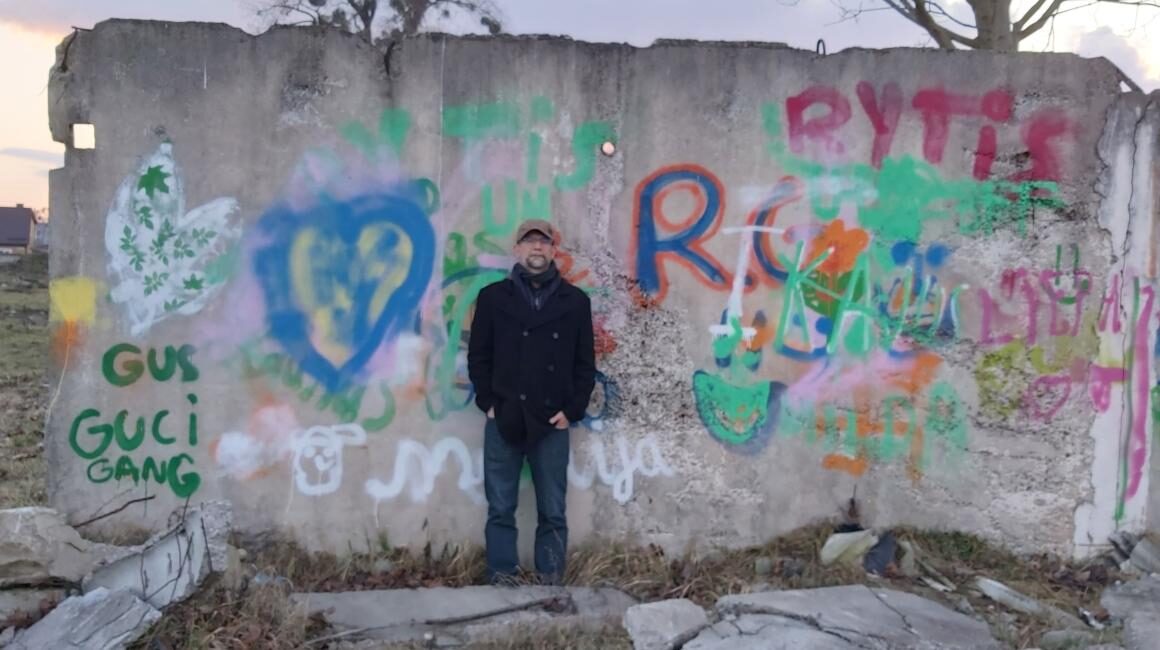
Professor Paul Draus in the Lithuanian neighborhood of Sanciai.
A historic waterfront location, recovering from the impacts of industrialization, is in a precarious position. It’s becoming a hotspot for development and this new interest and money is threatening to replace — and displace — the people and places that persevered during the neighborhood’s most challenging times.
This describes Sančiai, Lithuania. It is one of the oldest districts of Kaunas, Lithuania’s second largest city.
Does the description sound familiar? Sociology Professor Paul Draus thought so. Draus often works with Detroit citizens and organizations to reimagine Detroit neighborhoods and spaces. The contexts are different — after all, no two places are the same — but Draus noticed that gentrification and socio-economic concerns experienced in Detroit are also evident in other places around the world.
To learn from one another and share about social and environmental justice efforts happening nearly 5,000 miles apart, Draus is working with Lithuanian educators, community leaders, activists, researchers and others in a new cross-national research project that’s supported by a Fulbright U.S. Scholars Award.
The U.S. Fulbright Scholar exchange program, sponsored by the U.S. Department of State Bureau of Educational and Cultural Affairs, awarded multiple grants to UM-Dearborn faculty in the 2022-2023 cycle. Linguistics Professor Daniel Davis and Collegiate Lecturer Kristian Stewart also earned awards. Read more about Stewart’s work here. Davis’ research project will be highlighted in a June 14 UM-Dearborn news article.
Draus, who will travel to Lithuania in early 2023 for his Fulbright project, said he got the idea after helping to organize a workshop on urban spaces that took place in Lithuania in 2020, just as the pandemic was emerging.
Having worked extensively on place-making projects in Detroit, like developing alleys into useful neighborhood spaces and installing locally designed wind turbines in community settings, Draus was interested in how the Lithuanian people were incorporating neighborhood histories into the design of amenities that reflect the life in their communities. The more he heard, the more similarities he noticed.
Draus learned that the city of Kaunas has proposed redevelopment in Sančiai, a working-class neighborhood where underrepresented people have disproportionately borne the burden of the negative consequences linked to urbanization and industrial development. A real estate development threatened to destroy access to an area along the Nemunas River that was greatly valued by locals.
And, in the eastern part of the country, the community concern over the logging by large outside corporations like IKEA in Lithuania’s treasured Labanoras Forest was largely ignored. Draus saw a connection between these struggles and those taking place right here in Michigan.
“As a sociologist, I see the climate crisis as inseparable from issues of social inequality. Record-setting heat waves and floods in Germany signal what the future is likely to hold for other European countries, even those that lie further north. Lithuania has rich natural resources in the form of rivers, lakes and forests, but is less financially secure than some other European countries,” he said. “In both (Michigan and Lithuania), there are situations of historical trauma that must be considered when developing strategies for addressing these problems both today and in the future.”
Working with faculty at Vytautas Magnus University (VMU), Draus developed a four-month Fulbright Scholar project with several different components. The plan is to engage more deeply with this community and the local landscapes — cultural and physical — that residents are striving to protect.
During his time in Lithuania, Draus will organize a series of seminars and workshops that offers undergraduate and graduate students the opportunity to engage in community-based projects, with community partners as active collaborators.
“The workshops would be oriented towards developing practical approaches to addressing specific problems or issues. The focus will be on problems that have multiple dimensions, such as urban redevelopment and environmental management, with students working alongside faculty and community-based experts to propose concrete alternative strategies.”
When he returns to the U.S., Draus hopes to bring home the lessons he learns from the activists and community leaders in Lithuania.
Building off this Fulbright research and teaching, Draus plans to develop a graduate curriculum in the area of social justice that will connect the UM-Dearborn and VMU campuses.
“It’s important to consider the role of power and inequality in shaping exposures to environmental pollution and risk, as well as access to natural resource benefits.
It’s also important to consider the potential for urban green space to address traumatic histories through the allocation of environmental benefits to populations that have been excluded or disadvantaged, an approach that I have called green reparations.”
Draus said past harms linked to political oppression and social exclusion may lead to continuing visible disparities in health and quality of life, even generations later. But solutions aren’t as obvious — that’s why a holistic approach is needed.
“There is a complex interconnection of social and environmental factors that is evident in all of these sites. Private developers and municipal governments need to understand these factors and then deliberately design and plan alternatives, transforming environments by incorporating community insights and listening to the voices of underrepresented groups.”
Contact: Sarah Tuxbury.


